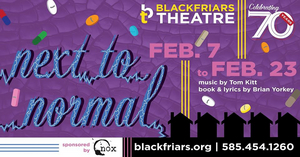Review: NEXT TO NORMAL at Blackfriars Theatre

Lights up. Enter the whirlwind. Blackfriars Theatre's production of NEXT TO NORMAL drops its audience smack in the middle of an emotional storm. The 2010 Pulitzer Prize winning rock musical details a family's sixteen-year struggle with trauma, centering on bipolar disorder. Groundbreaking in style and scope, Tom Kitt and Brian Yorkey's smash hit garnered eleven Tony nominations and won three. It has been celebrated for exploring hard-hitting subject matter without the dewy-eyed sentimentality that so often infects this theatrical genre. Fortunately, Blackfriars' production delivers with the power and grit of the original Broadway production.
Overtly, NEXT TO NORMAL chronicles the clinical difficulties in dealing with mental illness. The play is set squarely at the kitchen table of a seemingly typical middle class family. Diana Goodman (Janine Mercandetti) paces the floor in the wee hours of the morning worried because her teenage son, Gabe (Zachary Jones), has stayed out passed his curfew. This normal parental anxiety morphs into a standard suburban cornflake breakfast featuring an average American family; mom, dad and two teenage children getting ready for work and school. All seems ordinary until Diana starts compulsively making white bread sandwiches on the kitchen floor. From this crisis, the play spirals out of control as Diana ping-pongs from therapist to therapist, sampling pharmaceutical drugs, engaging in talk therapy, then flushing drugs down the toilet, more drugs, more therapy....The nightmare of diagnosing and treating bipolar disorder and depression is clearly established by the middle of act one. However, this play considers more than these clinical traumas that millions of families must endure. It explores the loneliness and isolation the family members create as they struggle to maintain the appearance of suburban normalcy while enduring extraordinary strife. By stoically refusing to confront their individual issues, each character's isolation and silence sows nothing but a hollow wind, and as the Biblical proverb professes, "They that sow the wind, shall reap the whirlwind."
The cast delivers strong performances across the board. Janine Mercandetti's powerful voice energizes her portrayal of Diana as she experiences turbulent mood swings (I Miss The Mountains), frustration (My Psychopharmacologist And Me) and loss (How Could I Ever Forget). As Dan, the husband and father struggling to keep his family together, J. Simmons' rich baritone voice expresses anger and power more clearly than anguish and passivity. He drives the feeling of discord in the family but his passionate portrayal may fail to create the stoic coldness that Diana refers to in her therapy sessions. As a powerful presence on stage, Simmons excels, faltering only when the character is most frail. Zachary Jones as Gabe possesses the most relaxed and natural voice in the cast. It jubilantly sparkles as he sings I'm Alive. It soars with ethereal beauty on the lyrical There's A World. It drives with passion on I Am The One. Haley Knips' Natalie, overshadowed by her mother's illness, typifies the overachieving teenage perfectionist trying to win her family's attention. Her frustration leads her to argue, rebel and ultimately demand to be recognized by Diana in her search for identity and acceptance. Her performance brims with heartfelt longing and dissatisfaction. Evan Miller Watelet portrays Henry with a quirky shyness. His light, pure vocals marry perfectly with his gentle portrayal of unwavering devotion to Natalie. His attentiveness to her and his unselfish fortitude is a welcome relief from the chaotic dysfunction of the family. Carl Del Buono rounds out the cast with exceptionally fine vocals as he convincingly takes on the roles of Dr. Fine and Dr. Madden.
As usual, Blackfriars Theatre does an excellent job of transferring a large-scale Broadway production to a more intimate space. The set is sparse but artistic and functional. The six-piece orchestra is on point and well balanced. The lighting often mirrors the emotional state of the scenes. Most importantly, director Kerry Young maintains the panoramic scope of the original production. One would think that a play about bipolar disorder would empathetically focus on the inner workings of the main character. However, NEXT TO NORMAL, almost Brechtian in its distancing, forces an audience to consider all the characters and their interrelationships. It is a play that continually parallels characters and their intentions. The music intentionally moves from solos to cacophonous choruses of chaos and discord. From the breath of Diana's delusion comes the whirlwind. The intimate space at Blackfriars places the audience in the eye of the storm.
For more information about Blackfriars' production of NEXT TO NORMAL or to obtain tickets, click here.
Reader Reviews

Videos
